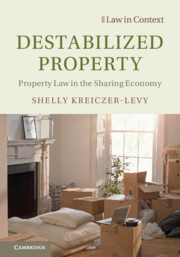Book contents
- Reviews
- Destabilized Property
- The Law in Context Series
- Destabilized Property
- Copyright page
- Dedication
- Contents
- Acknowledgments
- 1 Introduction
- 2 Stability and Property Use
- 3 The Decline of Stability in the New Millennium
- 4 The Rise of the Access Economy
- 5 Access as an Alternative to Ownership
- 6 Fragmentation of Intimate Property
- 7 Evaluating Flexibility in Property Use
- 8 What’s Next? The Future of the Access Economy
- 9 Conclusion
- Index
- Series page
1 - Introduction
Published online by Cambridge University Press: 25 October 2019
- Reviews
- Destabilized Property
- The Law in Context Series
- Destabilized Property
- Copyright page
- Dedication
- Contents
- Acknowledgments
- 1 Introduction
- 2 Stability and Property Use
- 3 The Decline of Stability in the New Millennium
- 4 The Rise of the Access Economy
- 5 Access as an Alternative to Ownership
- 6 Fragmentation of Intimate Property
- 7 Evaluating Flexibility in Property Use
- 8 What’s Next? The Future of the Access Economy
- 9 Conclusion
- Index
- Series page
Summary
The introduction discusses the changes in consumers' preferences and the symbolic and practical decline of ownership. Young consumers, especially millennials, prefer experiences over things, comfort and ease of use over ownership. It then presents the sharing economy phenomenon, renames it "the access economy" and introduces the main argument of the book: the sharing economy pushes for a mobile and flexible vision of engaging with possessions and, as a result, with other people. It then places this argument within the broader context of property discourse.
- Type
- Chapter
- Information
- Destabilized PropertyProperty Law in the Sharing Economy, pp. 1 - 15Publisher: Cambridge University PressPrint publication year: 2019

